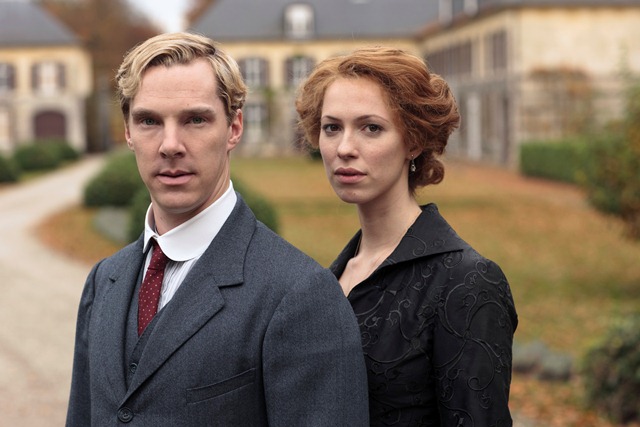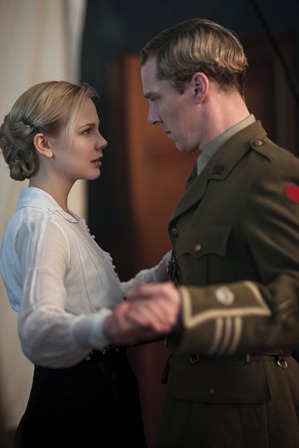CHICAGO – Patrick McDonald of HollywoodChicago.com appears on “The Morning Mess” with Dan Baker on WBGR-FM (Monroe, Wisconsin) on March 21st, 2024, reviewing the new streaming series “Manhunt” – based on the bestseller by James L. Swanson – currently streaming on Apple TV+.
TV Review: Star-Studded ‘Parade’s End’ is True Accomplishment
CHICAGO – HBO brings BBC2’s “Parade’s End,” based on the highly-acclaimed novels by Ford Madox Ford, stateside and the star-studded mini-series with a breathtakingly good script from the legendary Sir Tom Stoppard is a must-see for anyone interested in historical drama, quality acting, or the kind of stunning production values usually reserved for big-screen adaptations with Oscar aspirations. Propelled by a trio of Emmy-worthy performances from Benedict Cumberbatch (“Sherlock”), Rebecca Hall (“Vicky Cristina Barcelona”), and Adelaide Clemens (“Silent Hill: Revelation”) and a stunning supporting cast of classically trained actors (it’s like “The Avengers” for fans of British period pieces), “Parade’s End” is one of the most accomplished and impressive productions you’ll see on TV this year.
 Television Rating: 4.5/5.0 |
It’s also slow. Just a warning. One has to be an admirer of Stoppard’s brilliant way with words and consider the symbolic themes of a love triangle during one of the most politically, religiously, and societally tumultuous times in U.K. history to enjoy it. It is not as instantly accessible nor as soapy as “Downton Abbey” and its beats are often subtle and spread out over five hours, broadcast on three nights. It requires serious attention to the themes with which Stoppard is so eloquently playing to admire it and there are passages that are arguably too slow, even for this fan of the living legend.

Parade’s End
Photo credit: HBO
However, “Parade’s End” is not all dialogue. It is a piece about passion, war, women’s right, and religious change. It is a love triangle piece, essentially, but each point of the triangle is weighed down with issues like social position, scandal, moral fidelity, and religious rights. Much of it comes down to, as a character says, “how you are perceived as gentleman” and how passion and combat can conflict with that sentiment in the first place. Stoppard’s dialogue is incredible, capturing not just character but national mood through his way with words. When a young pacifist talks about the war in combative tones and says “I refuse to fight but give the guilty what they deserve,” it says something not just about him but a class of people who make decisions for others in wartime. And so much of the dialogue is just perfectly toned to Stoppard’s dry sense of humor. I loved quips like this one, delivered perfectly by Hall when told her social status is being downgraded by an unexpected move, “I will be in my room praying for death…or at least packing for it.”
It is the early 20th century in Edwardian England, one of the most notable times in the country’s history and a perfect backdrop for a story of repressed love. Why? Because it was a time when repression was ending. Women’s rights were at the forefront. War was on the horizon. A new generation would define a new era.
 Parade’s End Photo credit: HBO |
Our eyes into this beautifully-recreated time (with over 100 speaking roles and dozens of sets) is an aristocrat named Christopher Tietjens (Cumberbatch), a kind, vulnerable man who clearly feels the tug of a societal position that requires more conservatism than his understanding of where his country is going allows. Clearly attracted to a new future, Tietjens falls for the sexual, vibrant Sylvia (Hall), who may be pregnant with his child. Sylvia enters the world of aristocracy and almost immediately hates it. She is the opposite of etiquette, uninterested in corsets and willing to flirt with other men. It’s not long before she’s openly having affairs, forcing her and Tietjens into an estranged marriage of civility but not passion. Divorce would be a social disaster but they do not seem to love each other.
Into this dynamic comes the sweet, entrancing Valentine Wannop (Adelaide Clemens). While Wannop has a similar forward-thinking attraction for Tietjens, she is also much younger, kinder, and generally naive than Sylvia. Tietjens falls for her quickly but can do nothing about it. Or can he? And then World War I shakes everything up, forcing Tietjens into a role he never expected to play and complicating the lives of everyone in the United Kingdom.
Stoppard’s gift with language is the real gem here but that should not act as a slight on the stunning ensemble. Cumberbatch, so good on “Sherlock,” plays Tietjens in such a subtle, fascinating manner, reminding one of a young Peter O’Toole in the way that he portrays a complex, emotionally turbulent man beneath a refined exterior. His restraint is balanced by Hall’s exuberant performance and Clemens’ gentle demeanor. They’re all good and they’re all balanced by legends and great new actors including Roger Allam, Ann-Marie Duff, Rupert Everett, Stephen Graham, Janet McTeer, Rufus Sewell, Miranda Richardson, and Jack Huston, all wonderfully directed by Susanna White.
Five hours spent in Edwardian England can be a lot to ask for most audiences and I’m a little surprised that HBO is pushing it all out in one week (all five hours are actually available on HBO Go after tonight’s first two hours). Although this seems to be the new model, a la Netflix’s “House of Cards.” And, for the right audience, they’ll happily spend five hours in the impressive world of “Parade’s End.”
 | By BRIAN TALLERICO |


